Voters miss the boat


The "Most Valuable Player" award continued its evolution into the "Most Valuable Copy Creator" award today as Jimmy Rollins was named the NL MVP by the Baseball Writers Association of America. While Rollins had an excellent season, playing in every Phillies game and accumulating large numbers of at-bats, hits, runs, extra-base hits and stolen bases, he also accumulated a large number of outs. Those outs, which left him with just a .344 on-base percentage, are the difference between being the "most" valuable player in the league and being just one of many valuable ones.
Of course, what mattered wasn't Rollins' statistics, but that his teammates played well enough to help win 89 games, while David Wright's teammates played only well enough for his team to win 88. What mattered was that Rollins, in January, called his Phillies "the team to beat" in the NL East, then went out and had a career year. What mattered was that the Phillies made up a seven-game deficit with 17 games to play, and never mind that relief pitching and Chase Utley and the Mets' bullpen woes had as much to do with that as Rollins did.
This vote reflects the storyline, not the performance. All of the measures of performance that we have, from Value Over Replacement Player (VORP) to Wins Above Replacement Player (WARP) to -- well, pick your favorite stat -- yield roughly the same conclusion: that Jimmy Rollins was somewhere between the fifth- and eighth-best player in the NL this year, with overall value comparable to his double-play partner, Utley, who would himself have run away with this award if not for taking a John Lannan fastball off of his hand on July 26. Despite missing 28 games with the injury, Utley was as productive as Rollins was in a full season, a testament to the power of 66 points of on-base percentage.
Rollins wasn't even the best of the "storyline" candidates, the players who rose to the top of the discussion as the season drew to a close. Matt Holliday, who was the fourth-best player in the league by both VORP and WARP, was considered the co-favorite along with Rollins at the end of the regular season, a regular season that ended with Holliday face down in the dirt behind home plate at Coors Field, having just scored the run that clinched the wild card for the Rockies. Holliday, like a number of others, had better offensive (75.0 VORP to Rollins' 66.1, .318 EqA to Rollins' .290, 63.3 Runs Above Replacement to Rollins' 55.0) and defensive (10 Fielding Runs Above Average versus eight for Rollins, +9 in John Dewan's Plus/Minus system to Rollins' +7) statistics than Rollins did. All of those numbers account for position and park -- i.e., Rollins' being a shortstop and not playing home games in Coors Field are accounted for in those formulae.
As expected, the electorate completely missed the most valuable players in the league, because those players didn't have good enough teammates. Albert Pujols combined his typically great offense with a Gold Glove-caliber defensive season to produce the highest WARP total in the NL (11.3). David Wright, who did everything but pitch for the Mets in September, was second in the league in WARP (10.7) thanks to being its second-best offensive player and playing above-average defense at third base. Jake Peavy was not just the best pitcher in the league but he was also arguably its best player, also posting a 10.7 WARP.
The three best players in the league finished fourth (Wright), seventh (Peavy) and ninth (Pujols) in the MVP balloting, not because their performance was lacking, but because their teammates were.
In a close race there's nothing wrong with considering factors such as September performance, clutch performance (preferably with a statistical tool such as Win Probability Added, rather than anecdotes) and whether a team's games were played in a pennant race. This wasn't a close race, though; the gap between Pujols, Wright and Peavy and the rest of the league was more than one win, which is an enormous number in an MVP race. That they fared so poorly in the voting doesn't mean the statistics missed something; it means the voters couldn't resist the temptation, yet again, to reward the players who produced the best stories as opposed to the best seasons.
Jimmy Rollins is a great baseball player who had the best year of his career and was part of a division winner after making an offseason boast that he would be just that. Those things make him valuable, exciting and one of the best stories of 2007.
He just wasn't the most valuable player in the National League.
